Unit 3 Could you please tell me where the restrooms are Section B 2b-2d课件(共18张PPT) 人教版九年级英语全册
文档属性
| 名称 | Unit 3 Could you please tell me where the restrooms are Section B 2b-2d课件(共18张PPT) 人教版九年级英语全册 |
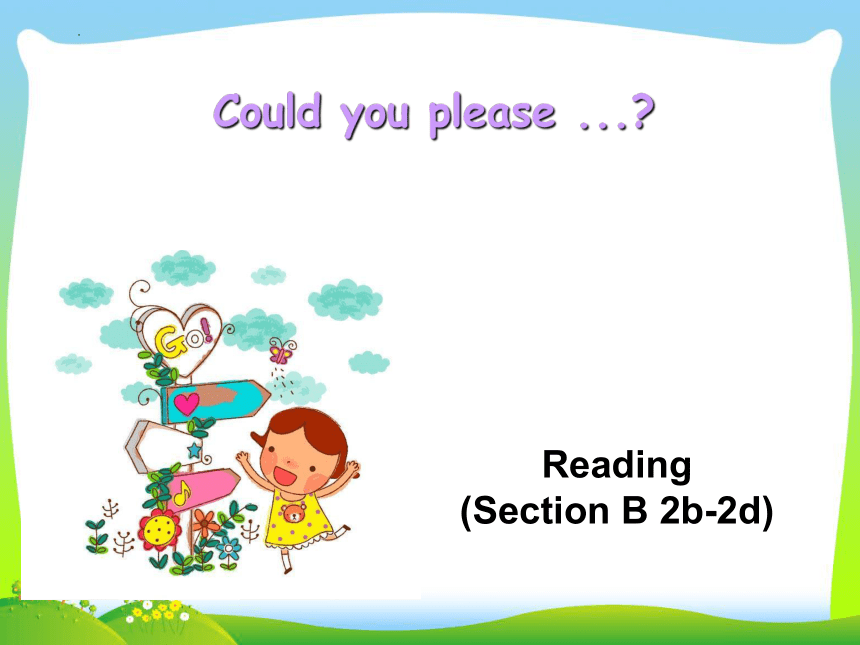
|
|
| 格式 | pptx | ||
| 文件大小 | 1.2MB | ||
| 资源类型 | 教案 | ||
| 版本资源 | 人教新目标(Go for it)版 | ||
| 科目 | 英语 | ||
| 更新时间 | 2024-11-01 22:10:02 | ||
图片预览


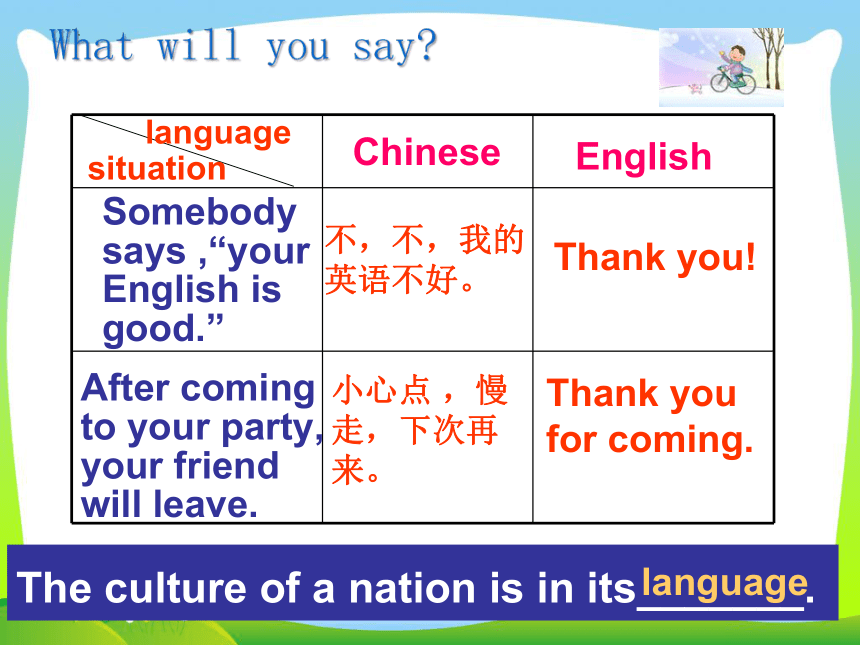
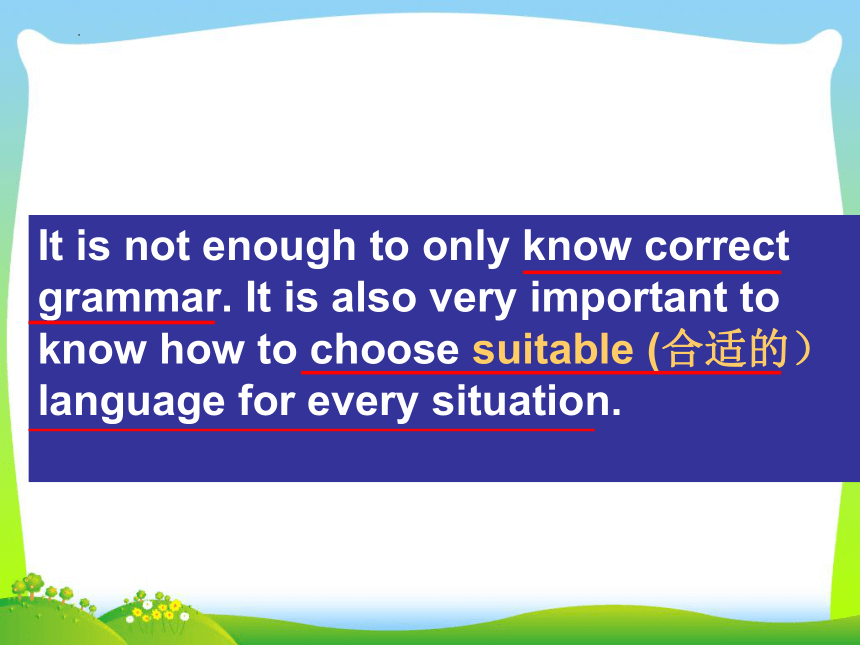
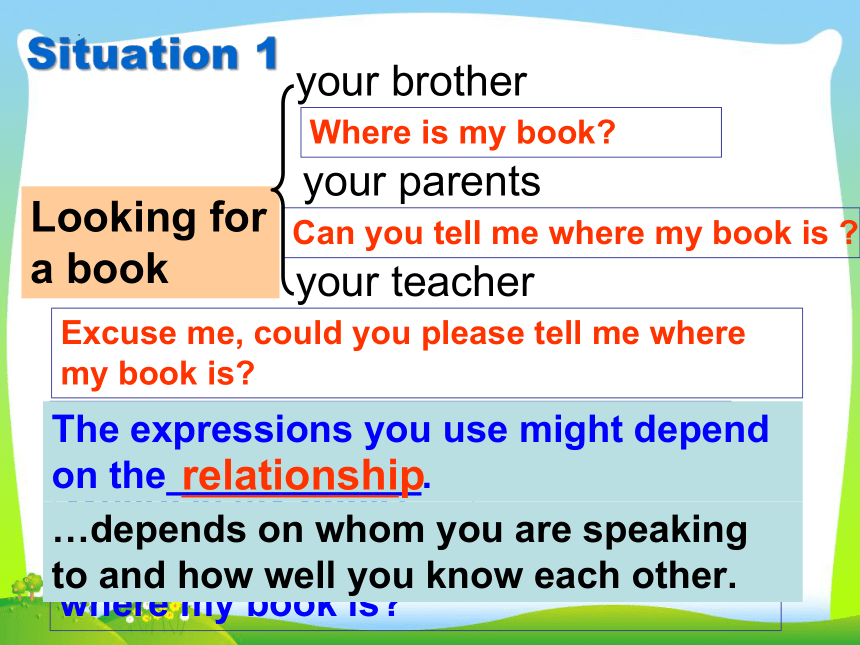
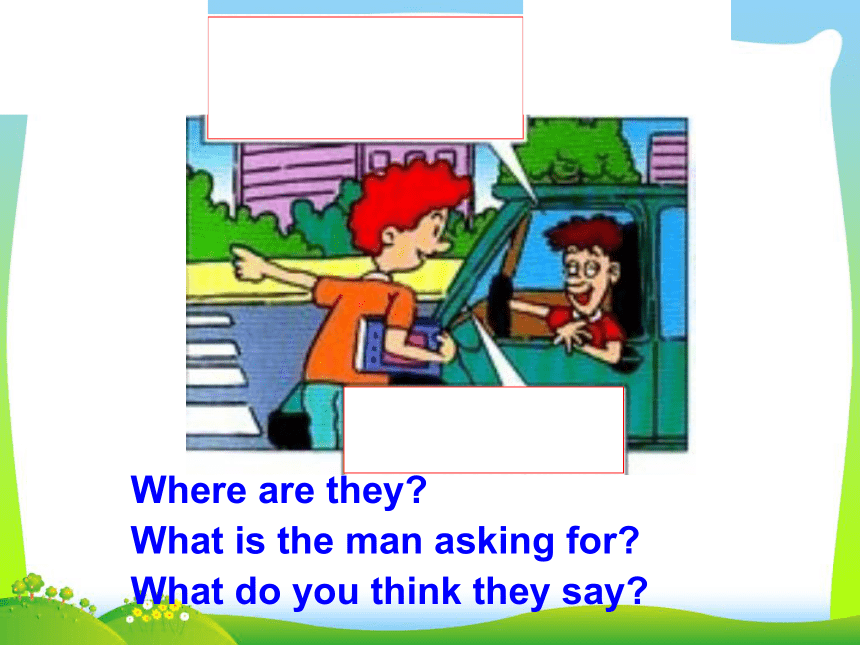
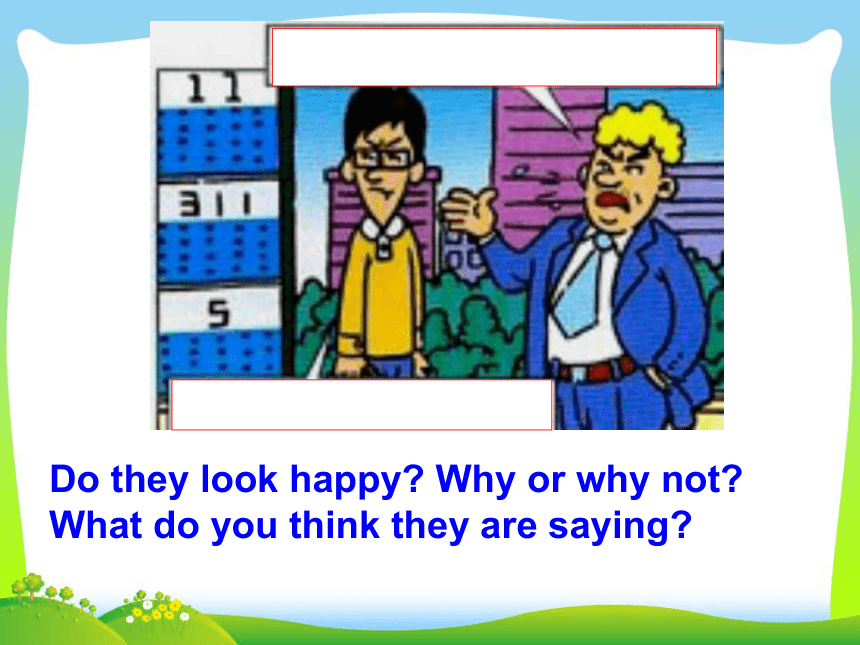
文档简介
(共18张PPT)
Could you please ...
Reading
(Section B 2b-2d)
Hello, nice to meet you, my name is ....
Hi, how are you
How do you do, my name is ....
Good morning/afternoon, welcome to….
Hello…,how’s it going …
When we meet for the first time,
we’d better say__________.
People always use different languages for different situations.
A.用法 B.场合
Chinese
English
situation
language
小心点 ,慢走,下次再来。
Thank you for coming.
不,不,我的
英语不好。
Thank you!
What will you say
Somebody says ,“your English is good.”
After coming to your party, your friend will leave.
The culture of a nation is in its_______.
language
It is not enough to only know correct grammar. It is also very important to know how to choose suitable (合适的)language for every situation.
Looking for a book
your brother
your parents
your teacher
Where is my book
Can you tell me where my book is
Excuse me, could you please tell me where my book is
Where is my book
Can you tell me where my book is
Excuse me, could you please tell me where my book is
Situation 1
The expressions you use might depend on the____________.
relationship
…depends on whom you are speaking to and how well you know each other.
What do you think they say
Where are they
What is the man asking for
Do they look happy Why or why not
What do you think they are saying
MAN 1
MAN 2
Who was better at asking for help: Man 1 or 2 Why
rude = impolite
How to speak to foreigners when they visit your country.
b) How you should ask for things differently in different situations.
c) How being polite will make you a better person and help you make friends.
This article is mainly about:
Read the article and underline the topic
sentence for each paragraph.
Paragraph 1
Paragraph 2
Paragraph 3
Paragraph 4
2b
When you visit a foreign country, it is important to know how to ask for help politely.
Good speakers change the way they speak in different situations.
Usually polite questions are longer.
It is important to learn how to use the right language in different situations.
1. What do you think the two questions in paragraph 1
2. Is it enough to just ask a question correctly
Both are correct English, but the first
one sounds less polite. Because it is a
very direct question.
No. We also need to learn how to be
polite when we ask for help.
Paragraph 1
3. What should we do when we are talking with different people
4. What might the expressions you use depend on
Paragraph 2
We should change the way we speak.
They might depend on whom you are
speaking to or how well you know them.
Paragraph 3
5. How to make questions more polite
Add expressions such as "Could you
please... or "May I ask... " . Sometimes
we need to spend time leading in to a
request.
Paragraph 4
6. Why is it important to learn how to use the right language in different situations
It will help you communicate better
with other people.
Find all the direct questions and polite requests from the passage.
Direct questions Polite requests
Where are the restrooms
1. Could you tell me where the restrooms are
2c
2. When is the school trip
3. Peter, tell me your
e-mail address.
2. Excuse me, Mr. West.
Do you know when
the school trip is
3. Peter, could you
please tell me
your e-mail address
Read the requests below. In the second column, write A if you would say it to someone you know and B if you would say it to a stranger. In the last column, write where you think these people are.
2d
Request Person Place
1. Will you pass the salt
2. Do you know where I can change some money, please
3. Could you tell me what just happened
4. Can you please tell me where the nearest station is
A
kitchen
B
street
B
street
B
street
Request Person Place
5. Excuse me, do you know what time it begins, please
6. Let me know when you’re ready, OK
7. Could you possibly tell me the way to the village school
B
cinema
A
home
B
street
词组翻译
1. 礼貌地求助
2. 举个例子
3. 相似的请求
4. 不够礼貌
5. 一个直接的问题
6. 他们说话的方式
7. 取决于
8. 很了解某人
9. 导入到一个请求
10. 与某人交流
11. 很抱歉打扰到你。
ask for help politely
for example
similar requests
less polite
a direct question
the way they speak
depend on
know sb well
lead in to a request
communicate with sb
I'm sorry to trouble you.
Could you please ...
Reading
(Section B 2b-2d)
Hello, nice to meet you, my name is ....
Hi, how are you
How do you do, my name is ....
Good morning/afternoon, welcome to….
Hello…,how’s it going …
When we meet for the first time,
we’d better say__________.
People always use different languages for different situations.
A.用法 B.场合
Chinese
English
situation
language
小心点 ,慢走,下次再来。
Thank you for coming.
不,不,我的
英语不好。
Thank you!
What will you say
Somebody says ,“your English is good.”
After coming to your party, your friend will leave.
The culture of a nation is in its_______.
language
It is not enough to only know correct grammar. It is also very important to know how to choose suitable (合适的)language for every situation.
Looking for a book
your brother
your parents
your teacher
Where is my book
Can you tell me where my book is
Excuse me, could you please tell me where my book is
Where is my book
Can you tell me where my book is
Excuse me, could you please tell me where my book is
Situation 1
The expressions you use might depend on the____________.
relationship
…depends on whom you are speaking to and how well you know each other.
What do you think they say
Where are they
What is the man asking for
Do they look happy Why or why not
What do you think they are saying
MAN 1
MAN 2
Who was better at asking for help: Man 1 or 2 Why
rude = impolite
How to speak to foreigners when they visit your country.
b) How you should ask for things differently in different situations.
c) How being polite will make you a better person and help you make friends.
This article is mainly about:
Read the article and underline the topic
sentence for each paragraph.
Paragraph 1
Paragraph 2
Paragraph 3
Paragraph 4
2b
When you visit a foreign country, it is important to know how to ask for help politely.
Good speakers change the way they speak in different situations.
Usually polite questions are longer.
It is important to learn how to use the right language in different situations.
1. What do you think the two questions in paragraph 1
2. Is it enough to just ask a question correctly
Both are correct English, but the first
one sounds less polite. Because it is a
very direct question.
No. We also need to learn how to be
polite when we ask for help.
Paragraph 1
3. What should we do when we are talking with different people
4. What might the expressions you use depend on
Paragraph 2
We should change the way we speak.
They might depend on whom you are
speaking to or how well you know them.
Paragraph 3
5. How to make questions more polite
Add expressions such as "Could you
please... or "May I ask... " . Sometimes
we need to spend time leading in to a
request.
Paragraph 4
6. Why is it important to learn how to use the right language in different situations
It will help you communicate better
with other people.
Find all the direct questions and polite requests from the passage.
Direct questions Polite requests
Where are the restrooms
1. Could you tell me where the restrooms are
2c
2. When is the school trip
3. Peter, tell me your
e-mail address.
2. Excuse me, Mr. West.
Do you know when
the school trip is
3. Peter, could you
please tell me
your e-mail address
Read the requests below. In the second column, write A if you would say it to someone you know and B if you would say it to a stranger. In the last column, write where you think these people are.
2d
Request Person Place
1. Will you pass the salt
2. Do you know where I can change some money, please
3. Could you tell me what just happened
4. Can you please tell me where the nearest station is
A
kitchen
B
street
B
street
B
street
Request Person Place
5. Excuse me, do you know what time it begins, please
6. Let me know when you’re ready, OK
7. Could you possibly tell me the way to the village school
B
cinema
A
home
B
street
词组翻译
1. 礼貌地求助
2. 举个例子
3. 相似的请求
4. 不够礼貌
5. 一个直接的问题
6. 他们说话的方式
7. 取决于
8. 很了解某人
9. 导入到一个请求
10. 与某人交流
11. 很抱歉打扰到你。
ask for help politely
for example
similar requests
less polite
a direct question
the way they speak
depend on
know sb well
lead in to a request
communicate with sb
I'm sorry to trouble you.
同课章节目录
- Unit 1 How can we become good learners.
- Section A
- Section B
- Unit 2 I think that mooncakes are delicious!
- Section A
- Section B
- Unit 3 Could you please tell me where the restroom
- Section A
- Section B
- Unit 4 I used to be afraid of the dark.
- Section A
- Section B
- Unit 5 What are the shirts made of?
- Section A
- Section B
- Review of Units 1-5
- Unit 6 When was it invented?
- Section A
- Section B
- Unit 7 Teenagers should be allowed to choose their
- Section A
- Section B
- Unit 8 It must belong to Carla.
- Section A
- Section B
- Unit 9 I like music that I can dance to.
- Section A
- Section B
- Unit 10 You're supposed to shake hands.
- Section A
- Section B
- Review of Units 6-10
- Unit 11 Sad movies make me cry.
- Section A
- Section B
- Unit 12 Life is full of the unexpected
- Section A
- Section B
- Unit 13 We're trying to save the earth!
- Section A
- Section B
- Unit 14 I remember meeting all of you in Grade 7.
- Section A
- Section B
- Review of Units 11-14
